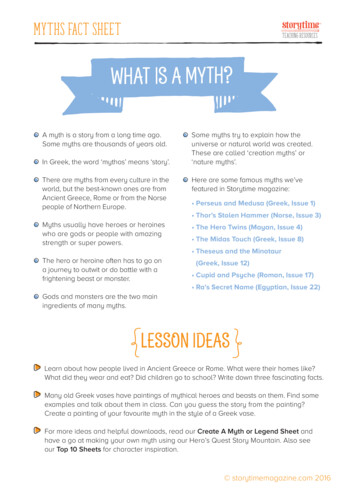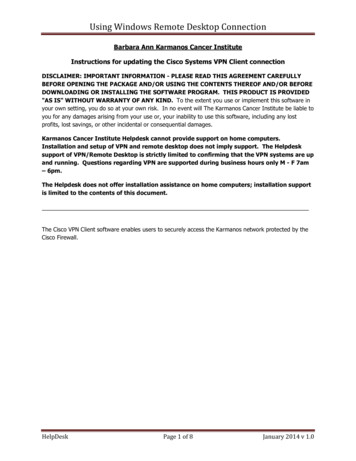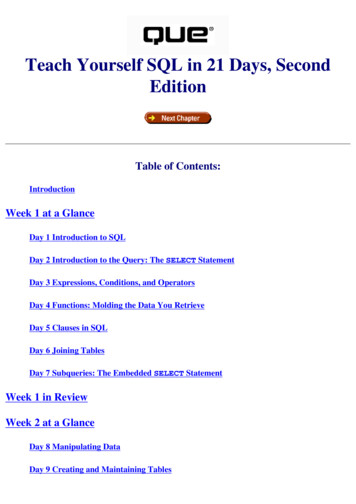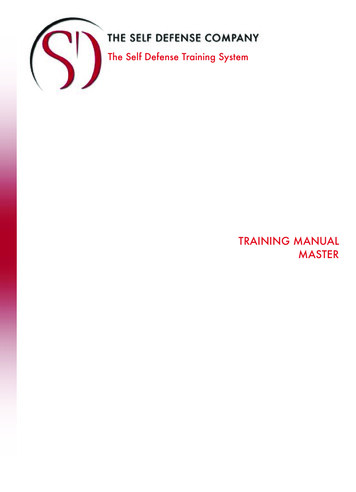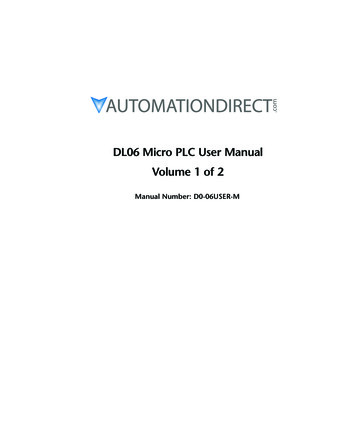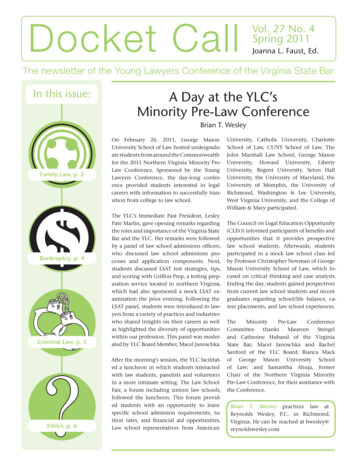
Transcription
Vol. 27 No. 4Spring 2011Joanna L. Faust, Ed.In this issue:A Day at the YLC’sMinority Pre-Law ConferenceBrian T. WesleyFamily Law, p. 2On February 26, 2011, George MasonUniversity School of Law hosted undergraduate students from around the Commonwealthfor the 2011 Northern Virginia Minority PreLaw Conference. Sponsored by the YoungLawyers Conference, the day-long conference provided students interested in legalcareers with information to successfully transition from college to law school.Criminal Law, p. 5The YLC’s Immediate Past President, LesleyPate Marlin, gave opening remarks regardingthe roles and importance of the Virginia StateBar and the YLC. Her remarks were followedby a panel of law school admissions officers,who discussed law school admissions processes and application components. Next,students discussed LSAT test strategies, tips,and scoring with Griffon Prep, a testing preparation service located in northern Virginia,which had also sponsored a mock LSAT examination the prior evening. Following theLSAT panel, students were introduced to lawyers from a variety of practices and industrieswho shared insights on their careers as wellas highlighted the diversity of opportunitieswithin our profession. This panel was moderated by YLC Board Member, Macel Janoschka.Ethics, p. 6After the morning’s session, the YLC facilitated a luncheon in which students interactedwith law students, panelists and volunteersin a more intimate setting. The Law SchoolFair, a forum including sixteen law schools,followed the luncheon. This forum provided students with an opportunity to learnspecific school admission requirements, tuition rates, and financial aid opportunities.Law school representatives from AmericanBankruptcy, p. 4University, Catholic University, CharlotteSchool of Law, CUNY School of Law, TheJohn Marshall Law School, George MasonUniversity, Howard University, LibertyUniversity, Regent University, Seton HallUniversity, the University of Maryland, theUniversity of Memphis, the University ofRichmond, Washington & Lee University,West Virginia University, and the College ofWilliam & Mary participated.The Council on Legal Education Opportunity(CLEO) informed participants of benefits andopportunities that it provides prospectivelaw school students. Afterwards, studentsparticipated in a mock law school class ledby Professor Christopher Newman of GeorgeMason University School of Law, which focused on critical thinking and case analysis.Ending the day, students gained perspectivesfrom current law school students and recentgraduates regarding school/life balance, career placements, and law school hanksMaureenStengeland Catherine Huband of the VirginiaState Bar; Macel Janoschka and RachelSanford of the YLC Board; Bianca Mackof George Mason University Schoolof Law; and Samantha Ahuja, formerChair of the Northern Virginia MinorityPre-Law Conference, for their assistance withthe Conference.Brian T. Wesley practices law atReynolds Wesley, P.C. in Richmond,Virginia. He can be reached at bwesley@reynoldswesley.com
Family Law CornerAndrew R. TankWho Gets the Family Pet?I was caught off guard when a client toldme that he expected the most contentious issue of his divorce to be ownershipof the family dog. My client was eventually able to work out a visitation schedule,but what if that was not the case and acourt had to decide?As heartless as it may sound to animallovers, the law views pets as property.1And like other property in dispute in adivorce, courts will apply the equitabledistribution statute2 to settle disputesover pet ownership. You might think thatthere is no appellate case law on point,but you would be wrong. In February of2011, the Court of Appeals decided thecase of Whitmore v. Whitmore,3 where thecentral issue was the ownership of theparties’ Welsh Corgi.The Whitmores purchased the dog during their marriage for 750. Both parties’names were on the dog’s registration certificate. When the parties separated, thedog stayed in the marital residence withMs. Whitmore, but Mr. Whitmore keptit for periods of time during the parties’separation. Mr. Whitmore asked the trialcourt to award him sole possession of thedog or shared possession with a visitationschedule. Ms. Whitmore did not wantto share the dog because Mr. Whitmore’sadulterous affair had destroyed theirmarriage.the dog as an inanimate object, and thatit failed to consider the best interests ofthe dog. The Court of Appeals disagreedand upheld the trial court’s decision.The lesson of the Whitmore case is toavoid going to court over pet ownership.The equitable distribution statute wasnot drafted with pets in mind, and it is aclumsy means by which to resolve suchdisputes. Nothing in the equitable distribution statute suggests a court has theauthority to establish a visitation schedule for a pet, and pets cannot be dividedin half. In the worst-case scenario, anunsympathetic judge who is annoyed tohave to hear the case could order that apet be sold with the proceeds divided between the parties. More likely, the courtwill award the pet to one of the partiesand the other will be given a monetaryaward that will not come close to compensating the parties for the loss of anypet worth fighting over.Applying the equitable distribution statute, the trial court found the dog to bemarital property. The court noted thatboth parties contributed to the acquisition, care, training, and maintenanceof the dog, and that both loved the dog,considered it to be a family member, andhad a strong bond with it. The courtdeclined to establish a visitation sched- 1. See Virginia Code §3.2-6585.ule and instead awarded the dog to Ms. 2. Virginia Code §20-107.3.Whitmore because she had the dog dur- 3. 2011 Va. App. LEXIS 57ing most of the parties’ separation. Mr.Andrew R. Tank practices family lawWhitmore was awarded 750 to compenat Surovell Isaacs Petersen & Levy,sate him for the price of the dog. AmongPLC in Fairfax. He may be reachedMr. Whitmore’s arguments on appealat atank@siplfirm.com.were that the trial court erred by treatingMake a Difference. Volunteer.The YLC’s Immigrant Outreach Committee is now recruiting volunteers to help organize anumber of projects, including CLEs on the Immigration Consequences of Criminal Convictions,Immigration Hot Topics and Red Flags for General Practitioners, and Immigration Options forVictims of Domestic Violence. The time commitment is not large, but we need volunteers whowould like to actively participate. For more information or to sign up, please contact Emily Sumnerat esumner@challaw.com or Hyojin Bae at HBae@berrylegal.com.page 2 Docket Call
President’s MessageCarson H. SullivanWell, this is it — my last column as co-sponsors with Virginia Lawyers Media.President of the YLC. First, I want to say It’s a 5K that takes place on the Boardwalkthat I am so proud of the work that the on Friday, June 17, at 7:30 a.m. Yes, it’sYLC has done this year; I cannot thank early, but if you’re a runner, you probablyour dedicated volunteers enough for all of expect that.their efforts on our programs and initiatives. From our Oliver Hill/Samuel TuckerThe YLC is hosting the Showcase CLE.Pre-Law Institute last July, to our three The topic is evidence, but the theme isMinority Pre-Law Conferences (held in Judiciary Squares – a spin on the clasLexington, Williamsburg and Arlington), sic game show Hollywood Squares. Ourto our new Mental Health Law CLE, vol- “squares” are nine judges, includingunteers all over the Commonwealth have Supreme Court of Virginia Chief Justicebeen doing so much for the Bar and their Cynthia D. Kinser. I can’t promise thatcommunities. I have been highlighting they will be sitting in a giant tic-tac-toeour successes in my Virginia Lawyer ar- board, but I can promise you will be enticles, so I won’t repeat them here. If you tertained as you earn your CLE credit.have not read those articles, look them The CLE starts right after the race onup in your spare time! http://www.vsb. Friday at 8:45 a.m.org/site/publications/.310The Top Ten ReasonsYou Should Attend theVSBAnnual MeetingSecond, I want to convince you all tocome to the VSB Annual Meeting to beheld in Virginia Beach from June 1619, 2011. There are a lot of reasons youshould join us for the meeting, but hereare the top ten (in no particular order,unlike a true Letterman list):on the Hill. This recep1tionThetakesReceptionplace on Thursday, June 16, at6:30 p.m. It’s a great venue – on the hillin front of the original Cavalier Hoteloverlooking the ocean.You can run a race. If you’re the2sporty type, you can run in the 30thAnnual Run in the Sun, which the YLCThere is lots of CLE credit to be had.4In addition to the Showcase CLE, thereare many other CLE programs you canattend. Take a look at the brochure /index.php.You can attend the YLC’s annual5membership meeting. Join the YLC forcocktails and lunch as we present ourOutstanding Service Awards and our R.Edwin Burnette Jr. Young Lawyer of theYear Award. I will also be passing thegavel to our incoming YLC President,Christy Kiely of Richmond.6We’re having a poolside reception.Where else would the young lawyers bethan gathering beside the pool on Fridaynight at 5:30 p.m.?You won’t be sitting home bored on7a Fridaynight. After the YLC poolsidereception, you can attend incoming VSBPresident George Shanks’s President’sReception. We’ll then head to theBanquet where he will be installed asPresident. The YLC usually has severaltables at the banquet, so be sure to purchase your tickets for that event.Everyone loves volleyball. The Annual8David T. Stitt Memorial VolleyballTournament, which is co-sponsoredby the YLC and Fidelity National TitleGroup, will start at 1 p.m. on Saturday,June 18th. Come play (or watch others)bump, set, and spike in the sand.Networking, anyone? I’ve said it be9fore and I’ll say it again—it is nice tomeet other lawyers besides those whomyou work with every day. The AnnualMeeting offers great opportunities to network with lawyers and judges from allover Virginia. Also, if you are interestedin getting involved with the YLC, comemeet our Board members, circuit representatives, and program chairs.It’s at the beach. Last, but not least,10I promise you that being at the beach isbetter than sitting in your office. I havebeen attending the meeting for severalyears, and you will definitely be able tomake time for a little ocean-going, or thepool if you’re less adventurous.So there is my list. Since you are alreadyon-line reading this column, why notregister now? If you are a first-time attendee, the cost is only 130, and if youhave been before but register before May13, you can take advantage of the earlybird pre-registration ( 155, v. 180 afterMay 13). All the forms are on the VSBwebsite – go ahead, sign up today! I hopeto see you there.Carson Sullivan lives in Arlingtonand practices employment law atPaul, Hastings, Janofsky & WalkerLLP in Washington, D.C. She canbe reached at carsonsullivan@paulhastings.com.Spring 2011 page 3
Bankruptcy BulletsMartha E. HulleyLearning the LingoWelcome to the latest installment ofBankruptcy Bullets, a quick-referenceguide intended to assist attorneys in navigating the sometimes intimidating andoften confusing arena of bankruptcy law.This article is the second installment providing some elementary explanations forwords unique to the bankruptcy process.Remember that what is presented hereare merely the most basic of descriptions. A SSUMPTION: If a lease or executorycontract is assumed in a bankruptcycase, then the debtor must bring thelease or executory contract current, andthat creditor is then treated as a priority creditor for all obligations owed onthe assumed lease/executory contract.Further discussion of the requirementsand consequences of assumption canbe found at 11 U.S.C. § 365.court, and is often held at an alternative location, such as the U.S. Trustee’s REJECTION: If a debtor opts to “reject”the lease or executory contract, he givesoffice.1 The debtor is deposed by theup the benefits of the contract, andtrustee and any creditors in attendance.the other party to the lease becomes aMany creditors use this meeting as anpre-petition unsecured creditor for anyopportunity to gain valuable informadamages under the contract. Dependingtion regarding collateral, the debtor’son the type of contract/lease, certainintentions to reorganize, and the likedamages caps are articulated in thelihood of distributions on claims. TheBankruptcy Code. Further discussion ofmeeting is often referred to as the “341the requirements and consequences ofMeeting” because it is governed by 11rejection can be found at 11 U.S.C. § 365.U.S.C. § 341 of the Bankruptcy Code. ADVERSARY PROCEEDING: An adversary proceeding is a separate proceeding P REFERENCE: Probably one of the mostfrom the main bankruptcy case and is CONFIRMATION: In bankruptcy caseshated and confusing concepts of thecommenced by the filing of a complaint.where a debtor must file a plan of reorgabankruptcy code is the concept thatAlthough it is separate from the mainnization (or liquidation), the bankruptcycreditors who are paid by debtors imbankruptcy case, it is related and thecourt must confirm a debtor’s plan in ormediately prior to the bankruptcy filingresults of such a proceeding impact theder for a debtor to successfully navigateare required to pay that money “back”main bankruptcy case. The procedureshis bankruptcy case and receive his disto the debtor, or face a lawsuit (an “admirror those of standard federal courtcharge. The debtor first files his plan ofversary proceeding” for those payingproceedings. For a technical definitionreorganization, which describes how heattention!) The concept here is that ofof what disputes are brought as adverintends to reorganize his debts and payten a debtor on the brink of bankruptcysary proceedings, see Federal Rule ofhis creditors. The plan is then subject towill choose to pay certain creditors overBankruptcy Procedure 7001.voting by all eligible creditors, and thenothers. Because one of the main tenetsmust be “confirmed” by the bankruptcy CONTESTED MATTER: A contested matof the bankruptcy system is to promotejudge. A confirmed plan receives theter is similar to an adversary proceeding,fairness among creditors, the trustee issame treatment as a final order, and resexcept that it occurs wholly within thegranted the power to recover transfersjudicata applies.main bankruptcy case, and does notpaid to a “preferred” creditor, so thathave the same due process requirements E XECUTORY CONTRACT: An exthe funds may be distributed among allof a separate adversary proceeding.ecutory contract is a contract wherecreditors in similar positions. There are,Contested matters are evidentiary hearperformance by the debtor and/or theof course, many statutory defenses thatings, and discovery is often permitted.other party/creditor to the contract ismay be raised in a “preference action,”Generally contested matters cover thosestill remaining following the filing ofand further discussion can be found insubject areas not included under FRBPthe bankruptcy petition. In other words,11 U.S.C. § 547.7001. Some examples of common confailure to perform by either party would1. T he chapter under which the case has been filedtested matters are motions to lift theresult in a breach of contract. Examplesdetermines which trustee presides. For example,automatic stay and objections to proofsof executory contracts include leasthe Chapter 7 trustee will preside over Chapter 7of claim.es, intellectual property licenses, and341 meetings, whereas the U.S. Trustee will presideover Chapter 11 341 meetings.employment contracts. A debtor can 341MEETINGOFCREDITORS:choose to assume or reject an executoryFollowing the commencement of aMartha E. Hulley practices bankruptcycontract in bankruptcy. Be forewarned,bankruptcy case, a debtor is required tolaw at LeClairRyan, P.C. in Alexandria.however: executory contract issues canappear and testify before a meeting ofShe may be reached at martha.hulget messy quickly.all his creditors. The meeting is presidedley@leclairryan.com.over by the trustee, not the bankruptcypage 4 Docket Call
If you’ve spent any time in the hallways of a courthouse during a criminaldocket call, chances are you have heardthe name “Hernandez”. In January, theSupreme Court of Virginia decided thecase of Hernandez v. Commonwealth, 281Va. 222 (2011). Since then, defense attorneys, prosecutors, and judges alike havebeen consumed with speculation aboutthe implications of Hernandez, the properuse of the Court’s decision, and whetheror not the General Assembly will react.In Hernandez, the Supreme Court ofVirginia held that until a court enters afinding to hold a defendant guilty of acrime, the court retains inherent authority to take the matter under advisementor to continue the case for disposition ata later date. Id. This decision draws intosharp focus a debate which has ragedwithin the defense and prosecution barsregarding the power of Moreau v. Fuller,276 Va. 127 (2008). In Moreau, the Court held that the actof rendering final judgment was a discretionary, not ministerial, act, andthus not subject to compulsion by acourt to fashion creative and individualized dispositions in criminal cases. TheHernandez decision touches on an oftdebated issue previously sparked by theSupreme Court’s decision in mandamus.Id. at 138-39. That holding followed thequestion of whether a court, having taken a criminal case under advisement fordeferred disposition, may be forced to enter final judgment as a ministerial dutyenforceable by mandamus.Two years later, Rafael Hernandez wasindicted for felony assault of a policeofficer. Under the relevant statute, aconviction requires the imposition of“a mandatory minimum term of confinement of six months.” Va. Code §18.2-57(c). Following the close of evidence at a bench trial, Hernandez askedthe court to defer disposition of the casefor a period of time and continue hisbond for the same period, while subjectto any conditions the court proscribed,and consider dismissal of the case if thedefendant complied with the court’sCriminal CornerAmy L. Bradleyorder. The trial court found that it didnot have the inherent authority to defera disposition where the Commonwealthdid not agree and the evidence was sufficient to support a finding of guilt.Hernandez challenged the trial court’sruling in the Court of Appeals, but to noavail. The Court of Appeals held that thecircuit court had neither statutory nor inherent authority to defer disposition ofthe case. Hernandez v. Commonwealth, 55Va. App. 190 (2009).The Supreme Court of Virginia awardedHernandez an appeal on the single assignment of error. The Court agreed withthe Court of Appeals’ observation thatonce a court has entered a judgment ofconviction of a crime, the question of thepenalty to be imposed is entirely withinthe province of the legislature and thecourt has no inherent authority to departfrom the range of punishment legislatively proscribed. 281 Va. at 225 (citing 55Va. App. at 196-97). However, the Courtdisagreed with the Court of Appeals’holding that the mere statement by ajudge that the evidence was sufficient tosupport a conviction amounts to a judgment of conviction. 281 Va. at 225-26(citing 55 Va. App. at 202). In sum, theCourt found that until a written order isentered finding a defendant guilty of acrime, the court has the inherent authority to take a matter under advisement orcontinue the case for final disposition ata later date. 281 Va. at 226.Prior to the Hernandez ruling, only tenstatutes authorized a court to defer and/or dismiss a criminal case: § 4.1-305 – Purchasing or possessingalcoholic beverages § 16.1-278.8 – Delinquent juveniles § 16.1-278.9 – Delinquent juveniles;loss of driving privileges for alcohol,firearm, and other drug offenses § 18.2-57.3 – First offense assault andbattery against a family or householdmember § 18.2-61 – Spousal rape § 18.2-67.1 – Spousal sodomy § 18.2-67.2 – Spousal object sexualpenetration § 18.2-251 – First offender drugpossession § 18.2-258.1 – Prescription fraud § 19.2-303.2 – First offender misdemeanor property offenseFollowing the Hernandez ruling, AssistantCommonwealth’s Attorney and DelegateC. Todd Gilbert, R-Woodstock, introduced House Bill 2513, to effectivelyrevoke the new common law authorityof Virginia courts to defer disposition incriminal cases. The bill sought passage ofa new Code section which would haveread: “No court shall have the authority,upon a plea of guilty or nolo contendereor after a plea of not guilty, when thefact found by the court would justify afinding of guilt, to defer proceedings orto defer entry of a final order of guiltyor to dismiss the case upon completionof terms and conditions except as provided by statute.” The Bill passed theHouse (76 to 22) with an amendmentlimiting the time for entering final orderto 60 days from the conclusion of evidence. The Bill never made it out of theSenate after being referred to the Courtsof Justice Committee.The scope of cases where a Hernandezdisposition could be requested is seemingly unlimited. As of now, the GeneralAssembly has not acted. However, thelikelihood of future legislation to limitHernandez is almost certain. Until then,the limits of Hernandez rest within thediscretion of Virginia’s courts.Amy L. Bradley practices criminal lawat the firm of Greenspun, Shapiro,Davis & Leary, P.C. in Fairfax. She maybe reached at ab@greenspunlaw.com.Spring 2011 page 5
Ethics CornerEmily F. HedrickA Lawyer’s Duty to Disclose Error to a ClientA lawyer who makes an error in the representation of a client must determinewhether she has a duty to disclose thaterror to the client. The primary source ofany duty to disclose is Rule 1.4, whichrequires the lawyer to “keep a client reasonably informed about the status of amatter” and to “explain a matter to theextent reasonably necessary to permit theclient to make informed decisions regarding the representation.” Further, Rule 1.7requires disclosure, and possibly withdrawal, in any case in which the lawyer’serror creates a conflict between the lawyerand client, such as when the lawyer’s representation of the client will be materiallylimited by the lawyer’s interest in avoid-ing malpractice liability or otherwiseavoiding responsibility for the error.These rules will not require disclosureof every error the lawyer makes. An error that does not affect the client’s caseor that is easily remedied will not requirethe client to make an informed decisionregarding the representation, nor will itcreate a conflict between the lawyer andher client. On the other hand, if the mistake creates a possible malpractice claimagainst the lawyer, then the lawyer isrequired to disclose that mistake, andto advise the client that he has a potential malpractice claim against the lawyer.LEO 1817. The rationale of LEO 1817also appears to require the disclosure ofany substantial violation of the Rules ofProfessional Conduct affecting the lawyer’s representation of the client, eventhough not all such violations will giverise to a civil claim against the lawyer.The fact that the lawyer has a clear personal interest in not admitting mistakessuggests that she should err on the side ofdisclosing the error in any close case.If the lawyer determines that she mustdisclose her error to the client, then sheshould provide a relatively broad disclosure. The disclosure must be sufficient toallow the client to make an informed decision about whether to change lawyers,whether to waive any conflict of interestand continue with the current lawyer,and to what extent corrective actions arepossible. Additionally, if the error is onethat she reasonably expects will give riseto a malpractice claim, the lawyer’s malpractice insurance policy likely requiresthat she immediately notify her insurerof the claim.Emily F. Hedrick is Assistant EthicsCounsel for the Virginia State Bar inRichmond. She may be reached athedrick@vsb.orgThe VSB’s 73rd Annual Meetingwill be held June 16–19, 2011. Goonline to ndex.php/ to keep up-to-date on allAnnual Meeting events.photo courtesy of Virginia Beach Convention and Visitors Bureaupage 6 Docket Call
What Today’s Real Estate Investors Need to KnowAbout Foreclosure-Related Lawsuits in Virginia(Part One of Two)John C. CowherdIf a borrower defaults on a mortgage inVirginia, the lender does not need to file alawsuit in a court in order to foreclose onthe real estate. In December 2010, a billwas introduced in the Virginia GeneralAssembly requiring court approval forforeclosure on all new mortgage loans.See S.B. 798 (Va. 2011). In February 2011,the Senate Courts of Justice Committeedecided not to move the bill forward.Given the General Assembly’s disinterestin transforming Virginia into a judicialforeclosure state, lenders and borrowersshould not expect a radical transformation of foreclosure law in 2011. While alender is not required to file suit in order to sell a distressed property, courts inVirginia can become involved in disputesover real estate loans at the parties’ request. If your client is investing in realestate in the current economic environment, he must be aware of how the courtsystem may become involved in the foreclosure process.In a non-judicial foreclosure state such asVirginia, the lender secures the PromissoryNote made by the borrower by filing aDeed of Trust in the local land records.The Deed of Trust authorizes a Trustee tosell the property at a public sale in theevent of a default by the borrower on thePromissory Note. See Va. Code § 55-59(7).Default is most often due to non-payment. The bank-appointed Trustee mustfollow the foreclosure terms of the Deedof Trust and the Code of Virginia, whichincludes giving certain notices. See Va.Code §§ 55-59.1 to 55-59.4.Short SalesMany investors today consider investing in real estate where the currentowner has a past-due loan. Sometimesthe owner tries to avoid foreclosure bynegotiating with the lender to sell theproperty for which the sum owing underthe loan documents exceeds the currentsale price. This scenario is called a “shortsale.” Short sales are attractive to investors because the property tends to be inbetter shape than those that have beenthrough foreclosure. However, few shortsales actually close. Short sales frustrateloan servicers, borrowers, and Realtorsbecause it is difficult to persuade thefinancial institutions that hold the promissory notes to agree that a short sale willreduce the lender’s losses. For this reason,investors tend to avoid short sales unlessthe property is of unique interest.Foreclosure SalesSome investors buy homes at foreclosuretrustees’ public sales. Normally the onlybidding party is the mortgagee bank itself. However, foreclosure sale propertiesare attractive to some investors seekingto acquire the property at the lowestpossible price. Unfortunately, buyers atforeclosure sales do not enjoy the typicalbenefits of purchasing real property, including many warranties and disclosuresthat give investors peace of mind concerning their investment. If a problemarises with property purchased at a foreclosure sale after settlement, the investormay lose months of rental income pending resolution of the issue, regardless ofwho is responsible for the problem.Post-Foreclosure SalesAlternatively, investors may seek to purchase properties already foreclosed uponby the lender. Most financial institutionsholding the promissory note secured bythe deed of trust are not in the businessof holding foreclosure homes as longterm investments. Sales of bank-ownedproperties to investors do not possess thepeculiarities of short sales or foreclosuretrustee’s sales.Part Two of this article will discuss thecommon types of legal actions arisingout of the foreclosure process. Wise investors, and their attorneys, take intoaccount the pendency or threat of sucha suit in weighing a potential purchase.John C. Cowherd is an AssociateAttorney at Culin, Sharp, Autry & Day,P.L.C. in Fairfax. He can be reached atjcowherd@csadlawyers.com.Free Mental Health Law CLEOn Friday, May 27th from 10 a.m. to 1 p.m. the Mental Health Law Committee will be hosting a free CLE (including one hour ofethics) on the campus of the George Mason University School of Law in Arlington regarding recent developments in mental healthlaw. Learn about recent developments in Mental Health Law in Virginia with an emphasis on involuntary civil commitment, whythese developments affect lawyers in every area of practice, and why every lawyer needs to be educated on these issues.For more information or to register, please contact one of the Committee’s co-chairs, Lara Jacobsat jacobs.lara@gmail.com or Ron Page at rpage@rpagelaw.com, or the Committee’s Board liaison,Nathan Veldhuis, at nathan.veldhuis@allenandallen.com.Spring 2011 page 7
A Day in the Life of a Judicial Law ClerkChristopher G. FindlaterThe jurors file down the halls of thechambers peering into our office as theypass by, the cannonade of feet clashingwith the classical music cascading fromour radio. They disappear into CourtRoom 1.Thereafter, a booming “Good Morning!”follows. Judge Nolan Dawkins, glasses in his left hand, stands tall at theoffice doorway. “Good Morning,” we reply. “Ready, sir?” his deputy asks. JudgeDawkins turns, slips on his glasses and replies, “Yeah. Let’s go render some justice.”The deputy opens the courtroom doorand ushers in the judge. “All rise. Court isin session. The Honorable ,” the deputybellows, until the slowly shutting doorsilences the pronouncement.I turn my focus back to my illuminatedwindow from which I view the world,nine to five, when Judge Haddock strollsin, wearing brown loafers, khakis, awhite dress shirt with a colorful bow tie,cupping his
Law Conference. Sponsored by the Young Lawyers Conference, the day-long confer- . to our new Mental Health Law CLE, vol-unteers all over the Commonwealth have been doing so much for the Bar and their . by the YLC and Fidelity National Title Group, will start at 1 p.m
![Welcome [dashdiet.me]](/img/17/30-day-weight-loss-journal.jpg)

